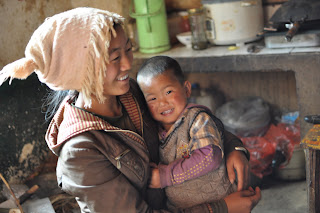These past two weeks CWEF hosted six high school interns from Concordia International School Shanghai (CISS) to help with various projects. I accompanied these six interns to two villages in Yunnan, one village that does not currently have a water system in place and another village that had a water project installed last fall by CISS. We interviewed families from both villages accessing the needs of the village without a water system and accessing how the new water project has helped the other village. Thanks to the interns hard work, we were able to gather all the information into a concise report laying out the villages needs and how a water project can help.

Two CWEF interns with a village woman
A few facts about village life:
- The majority of families work as farmers raising cows, pigs, sheep, chickens and horses.
- Most families eat two meals a day, morning and evening, that consist of corn, potatoes, rice and vegetables. Meat is eaten on the rare occasion.
- The average annual income per family is 1,300 RMB or 200 USD.
- This particular village's closest water source is 3 km away. Depending on if the family owns a horse cart dictates how often they get water. If they have a horse cart they can retrieve water once every 3 days and bring back 400 kg. If they do not have a horse cart, they need to go 1-2 times a day bringing back 40 kg each trip in buckets. This water is used for cooking and giving to livestock, rarely is it used for bathing.
- Each villager washes their hands twice a day, in the morning and at night. They give themselves a sponge bath every 10-15 days.
- The highest education level paid for by the government is elementary school so most villagers only have an elementary education. On the rare occasion someone will have finished middle school.

A village woman and her son during an interview
- Before the water project:
-Families bathed every 10-15 days to once a month.
-Villagers wash their hands only twice a day, morning and night.
-Less crops were grown and less water was given to livestock.
- After the water project:
-Villagers bathe every 2-3 days washing their hands 3-4 times a day or if dirty.
- The annual income for a family ranges from 0 RMB (villagers survive off of their crops but make no extra money) to 5,000-6,000 RMB (750-800 USD) all the way up to 20,000 RMB (3,300 USD)

Water from the new water system installed by CWEF and CISS
-Written by Heather Taylor, CISS Intern

Yeah, so Alex was stalking you and found this so naturally he sent everyone the link.
ReplyDeleteI've been stalking you all night.